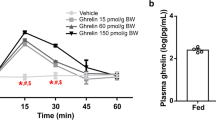Abstract
The isolation of ghrelin unveiled a new system implicated in food intake regulation. The recently isolated hormone obestatin derives from the same precursor of ghrelin and seems to perform opposite actions. It could be part of a dual system connecting gut and brain to regulate energy homeostasis. The ability of intracerebroventricular administration of obestatin to modify food intake was evaluated. Obestatin had no effect on spontaneous food intake in both ad libitum and food restricted rats. The obestatin injection was not able to antagonize the ghrelin-stimulated increase in food intake either. In conclusion, the present work does not support a role for obestatin on the regulation of food intake in any model studied.
Similar content being viewed by others
References
Kojima M, Hosoda H, Date Y, et al. Ghrelin is a growth-hormone-releasing acylated peptide from stomach. Nature 1999, 402: 656–60.
Tschop M, Smiley DL, Heiman ML. Ghrelin induces adiposity in rodents. Nature 2000, 407: 908–13.
Nakazato M, Murakami N, Date Y, et al. A role for ghrelin in the central regulation of feeding. Nature 2001,409: 194–8.
Wren AM, Small CJ, Ward HL, et al. The novel hypothalamic peptide ghrelin stimulates food intake and growth hormone secretion. Endocrinology 2000, 141: 4325–8.
Seoane LM, Lopez M, Tovar S, et al. Agouti-related peptide, neuropeptide Y, and somatostatin-producing neurons are targets for ghrelin actions in the rat hypothalamus. Endocrinology 2003, 144: 544–51.
Cummings DE, Weigle DS, Frayo RS, et al. Plasma ghrelin levels after diet-induced weight loss or gastric bypass surgery. N Engl J Med 2002, 346: 1623–30.
Zhang JV, Ren PG, Avsian-Kretchmer O, et al. Obestatin, a peptide encoded by the ghrelin gene, opposes ghrelin’s effects on food intake. Science 2005, 310: 996–9.
Jackson VR, Nothacker HP, Civelli O. GPR39 receptor expression in the mouse brain. Neuroreport 2006, 17: 813–6.
Carro E, Senaris RM, Seoane LM, et al. Role of growth hormone (GH)-releasing hormone and somatostatin on leptin-induced GH secretion. Neuroendocrinology 1999, 69: 3–10.
Lopez M, Seoane LM, Garcia MC, et al. Neuropeptide Y, but not agouti-related peptide or melanin-concentrating hormone, is a target peptide for orexin-A feeding actions in the rat hypothalamus. Neuroendocrinology 2002, 75: 34–44.
Author information
Authors and Affiliations
Corresponding author
Additional information
An erratum to this article is available at http://dx.doi.org/10.1007/BF03349203.
Rights and permissions
About this article
Cite this article
Seoane, L.M., Al-Massadi, O., Pazos, Y. et al. Central obestatin administration does not modify either spontaneous or ghrelin-induced food intake in rats. J Endocrinol Invest 29, RC13–RC15 (2006). https://doi.org/10.1007/BF03344174
Accepted:
Published:
Issue Date:
DOI: https://doi.org/10.1007/BF03344174




